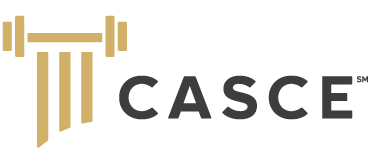Resources and FAQS
Find supplemental information about CASCE as well as answers to the most frequently asked questions about accreditation.
Pre-Application Toolkit
Get Started Quiz
Take this short quiz to find out how well you meet the minimum criteria for CASCE accreditation.
Take the quizProgram Readiness Tool
Use this spreadsheet to understand how your program can comply to the criteria required for CASCE accreditation.
Download the ToolDocument Library
Download and review the official CASCE Professional Standards & Guidelines for a deep dive into every standard that an accredited program must uphold. Download and read the Guide to Accreditation for a walkthrough of the process of becoming CASCE accredited. The Summary Document is a historical narrative of how and why CASCE was established.
Accreditation Grant
The CASCE Accreditation Grant offsets the cost of earning accreditation early by funding many of the fees required to gain accreditation.NSCA TV
Stream content showcasing NSCA event sessions, cutting-edge research, industry topics, and a channel devoted to CASCE-related content.General Accreditation FAQS
-
What is accreditation?
Accreditation is a process of validation in which colleges, universities and other institutions of higher learning are evaluated. In the United States, accreditation is a voluntary quality assurance process that symbolizes to the public that an institution and/or individual programs provide a quality education. The standards for accreditation are set by a peer review board whose members include faculty from various accredited colleges and universities.
-
What are types of accreditation?
In post-secondary education, there are two kinds of accreditation: Institutional and Programmatic. Institutional accreditation helps assure potential students that a college or university has met certain minimum standards in terms of administration, resources, faculty and facilities. Programmatic accreditation examines specific program(s) within an educational institution.
-
Why is accreditation needed in the field of strength and conditioning?
Gaining accreditation benefits the accredited program, its students, and the industry as a whole. Accreditation strengthens admissions recruitment efforts and enrollment growth. Prospective students can be confident in the quality of the accredited program they choose, and the industry gains a well-prepared and qualified workforce.
Most importantly, accreditation standards deliver assurance that the education and practical experience students receive from accredited programs will equip them as practitioners to keep athletes safe.
-
Why should our program pursue CASCE accreditation?
Accreditation adds value to a program and institution. CASCE accreditation is chosen by programs looking to be seen as a leader in strength and conditioning education. The high-level quality assurance of accreditation provides students (prospective, current, and graduates) the confidence in their choice of institution. And ultimately, only graduates of CASCE-accredited programs will qualify to sit for the Certified Strength and Conditioning Specialist (CSCS) exam. This ensures that the industry is supplied with professionals who know how to safeguard their athletes from unnecessary injury, while elevating the credibility and necessity of the profession in the eyes of the public.
-
Is CASCE an Institutional or Programmatic agency?
CASCE is a programmatic accrediting agency. This reflects a change to the current standard as the NSCA only requires Institutional accreditation. However, beginning in 2030, programmatic accreditation will be required.
-
What is the process for an educational program to become accredited through CASCE?
All accredited programs must go through a rigorous process, including:
- Application
- Self-Study
- On-Site Evaluation
- Committee Review and Recommendation
- Council Decision Rendered
-
When will the first academic programs be eligible to apply for accreditation?
Academic programs will be able to apply for accreditation in 2020 and submit a programmatic self-study by October 1, 2021. It is anticipated that the first programs will be accredited during the summer of 2022.
Program Administrator FAQ
-
How much does it cost for a program to be accredited?
- Application Fee: is $1,000 for non-ERP programs. Current ERP programs receive a reduced rate of $500. All application fees are non-refundable.
- If an institution chooses to defer to the next accreditation cycle, the fee will be due each year.
- If an institution chooses to defer to the next accreditation cycle, the fee will be due each year.
- Annual Fee: is $1,000 per accredited program (beginning October 1, 2022).
- Accreditation Fee: is $5,000, and is to be paid with submission of completed self-study.
- The accreditation fee includes review of self-study, all travel costs, and honorarium for peer reviewers.
- If there are multiple programs at the same institution seeking CASCE accreditation, the CASCE will work with the institution to discount the additional program accreditation fees.
- Late Fees: apply to any program with outstanding fees of more than 30 days. Additionally, the program will be placed on administrative probation.
- Application Fee: is $1,000 for non-ERP programs. Current ERP programs receive a reduced rate of $500. All application fees are non-refundable.
-
Do the Program Director and the Field Experience Coordinator have to be different individuals, or can the roles be held by the same person?
- Standard II.A. indicates the PD must be a full-time employee of the sponsoring institution, have full faculty status and have administrative release/reassigned workload equivalent to similar allied health programs in the institution.
- Standard II.B. states that the FEC must be a full-time employee of the sponsoring institution and have released/reassigned workload to meet the institutional responsibilities for overseeing the field experience.
- The Standards do not specifically state that these two roles must be held by different individuals, however, if the same individual held both roles, the program would need to show that the individual had released/reassigned time for both the Program Director role and the Field Experience Coordinator role. If the person was assigned released/reassigned roles like other Program Directors at the institution (Standard II.A.7 and II.A.9) that would leave very little workload for teaching responsibilities.
- It would be the responsibility of the institution to show that the academic workload for this faculty member was consistent with other faculty members and institutional policy.
- In addition, the program would need to provide justification for Standard II.D. regarding having sufficient faculty to meet the needs of the program.
-
What degree/concentrations will be acceptable to meet Standard III.B (The program must be a minimum of a concentration, or equivalent with a strength and conditioning in the title) for CASCE accreditation?
- The degree must be related to strength and conditioning. Examples include, but are not limited to:
- Exercise Science
- Kinesiology
- Sports Science
- Health Science
- Physical Education
- Programs that have specific questions regarding the degree at their institution and whether it qualifies to meet the CASCE accreditation standards should send written communication to the CASCE for clarification.
- The concentration (or equivalent) must have Strength and Conditioning in the title.
- The degree must be related to strength and conditioning. Examples include, but are not limited to:
-
Is there a non-digital application document available?
Yes. However, we highly recommend using the digital application, which can be saved and shared with others in your program to help complete. If you wish instead to download the application, you may find it here: CASCE Application[pdf].
Degree Requirements FAQ
-
If I graduate with a degree from an accredited Athletic Training or Physical Therapy Program (or other health profession) do I qualify for the CSCS examination?
- Until 2030 the requirements to sit for the CSCS exam are a minimum of a bachelor’s degree. There is currently no specific degree required to sit for the examination.
- It has not yet been determined by the Certification Committee if graduates of non-CASCE accredited programs of related professions (CAATE, CAPTE, ACOTE) will be eligible for the exam. That decision will be made closer to the 2030 deadline.
-
Why is the degree requirement changing?
In May 2017, the NSCA conducted a survey of strength and conditioning coaches and discovered that 87% of respondents were in favor of requiring that candidates hold a degree from an accredited strength and conditioning program prior to employment. The requirement is a concerted effort to elevate and advance the strength and conditioning profession.
-
What are the new CSCS degree requirements?
Targeted to take effect beginning in 2030 – to be eligible to take the CSCS examination, candidates must hold a bachelor’s degree from a program accredited by an NSCA-approved accrediting agency. This degree will have specific requirements that focus on strength and conditioning. The current degree requirement for the CSCS exam will remain in place until December 31, 2029.
-
What is the difference between the current and new degree requirement?
The current degree requirement is: “Candidates must hold at least a bachelor’s degree or currently be enrolled as a college senior at an accredited institution.” This means that currently, as long as the college or university is accredited, a bachelor’s degree in any field of study is acceptable. The NSCA Education and Certification Committees and the Board of Directors (in consideration of the membership and their constituencies), feel that this requirement needs to evolve to include degree requirements that are specific to the profession, to create a higher standard and ensure that future CSCS professionals have a strong foundation of strength and conditioning knowledge.
-
What degree will I need to have to be eligible to sit for the CSCS exam starting in 2030? | Updated
A bachelor’s degree from a program accredited by an NSCA-approved accrediting agency, in a strength and conditioning related field. This means that the degree must be related to the academic and experiential needs of the strength and conditioning profession. This change will align the CSCS with other allied healthcare professions, such as medical doctors, nurses, physical therapists and athletic trainers. Accreditation Standards will require the program to be a bachelor’s degree or higher with a concentration or equivalent titled “strength and conditioning”.
-
When will the new CSCS degree requirement begin? | Updated
The change to the degree requirement is targeted to go into effect in 2030. There will be a structured roll-out of the accreditation process so that all colleges and universities that wish to participate will have ample time to engage in the accreditation process. This is why the extended timeline has been established. It is anticipated that the first programs will be accredited in 2022.
-
If I graduate with a degree from an accredited Athletic Training or Physical Therapy Program (or other health profession) do I qualify for the CSCS exam?
Until 2030, the requirements to sit for the CSCS exam will continue to be a minimum of a bachelor’s degree. If you take the CSCS exam before 2030, any bachelor’s degree will qualify.
It has not yet been determined by the Certification Committee if graduates of non-CASCE accredited programs of related professions (CAATE, CAPTE, ACOTE) will be eligible for the exam. That decision will be made closer to the 2030 deadline.
CASCE Home | About | Why CASCE | The Process | Apply | Find a Program | Resources | News
Contact Us:
719-632-6722 x164
accreditation@nsca.com
CASCE
1885 Bob Johnson Dr.
Colorado Spring, CO 80906



